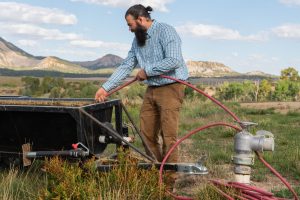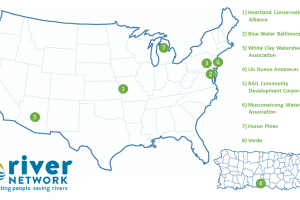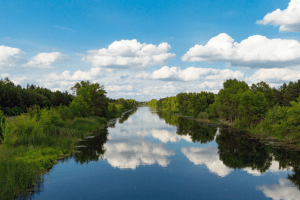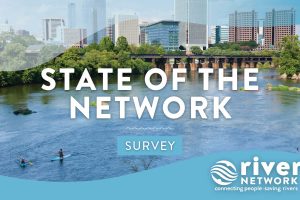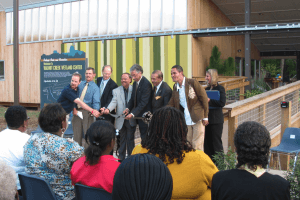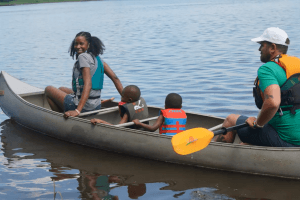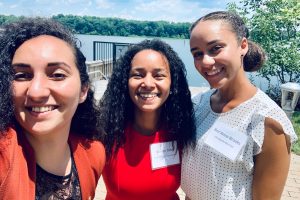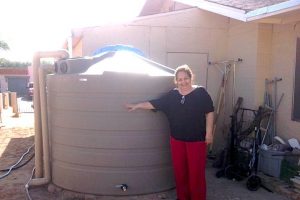Blog
Investing in Access to Clean and Safe Water Through the State Revolving Loan Funds
by Sheyda EsnaashariThe passage of the Infrastructure Investment and Jobs Act (IIJA) last fall – or what is now known as the Bipartisan Infrastructure Law (BIL) – has been celebrated by advocates across the country for its historic investment in water infrastructure. Most of this investment flows through the State Revolving Loan Fund Program (SRFs) – the… Read More ›
Mapping Water and Equity Considerations- Federal and State Tools
by Erin KanzigCollaborating for Agriculture & Water
by Mikhaela MullinsRiver Network staff have been busy over the past couple of years expanding the work within the key issue Healthy Rivers in Agricultural Landscapes. Defining a Path Forward In July 2021 we shared what we learned from conversations with water protectors around the country to learn how they work with agriculture on river health initiatives… Read More ›
Modernizing Irrigation Infrastructure with Colorado Farmers & Ranchers
by Mikhaela MullinsIn just six months, three new Project Coordinators, working with Colorado ditch companies and farmers and ranchers, have identified over 50 multi-beneficial projects to implement across the state. These projects will save water across the state, benefiting agricultural producers and the rivers they depend on. River Network supports these Coordinators as part of our continued… Read More ›
Meet the 2022 Climate Resilience Grantees
by Hannah MicoAs climate change continues to exacerbate existing burdens on communities and present new and unique challenges, River Network is expanding our work to assist local organizations in launching Community-Led Research (CLR) projects and Leadership Development (LD) programs. This year, with support of the Kresge Foundation and the Patagonia Foundation, we have connected with 8 new… Read More ›
Our Key Issues and the Next Five Years
by Nicole SilkResilience. Policy. Agriculture. Drinking water. What do these terms mean to you? For River Network, they’re the four key issues that are central to addressing the current water crisis in the United States. In 2018, based on input from the network, we introduced these key issues to focus our collective efforts through our Strategic Plan…. Read More ›
State of the Network Survey – We Need Your Help!
by Katherine BaerDo you ever play 20 questions? If so, you’re familiar with questions like “is it bigger than a breadbox,” and “is the person alive?” We’ve spent many family hiking trips using this fun game to make it up a big hill. Surveys also involve a lot of questions and while they don’t always seem as… Read More ›
National Conference Anchors Equity to the Future of America’s Waters
by Amy BoalFebruary 9, 2022 [Boulder, Colorado] – River Rally 2022 will take place at The Capital Hilton in Washington, DC, from June 4-7, 2022. Now in its 24th year, River Rally is the premier national conference for grassroots water advocates and river conservation professionals. Hosted annually by River Network, River Rally provides an inspiring and energy-infused… Read More ›
Trust Building Support Initiative – Applications Open Now!
by Katherine BaerApplications due February 28, 2022 River Network and the WaterNow Alliance are working together to provide support for community organizations and water utilities seeking to build trusting relationships as part of their work together toward more equitable and sustainable water and community outcomes. We are seeking applications from interested water utilities and community groups who… Read More ›
What does the Farm Bill have to do with Water Conservation?
by Erin KanzigTaking the Leap with Partners for Environmental Justice
by Hannah MicoHow does a small volunteer-run organization transition into a fully-fledged nonprofit? Partners for Environmental Justice (PEJ) (Raleigh, NC) recently committed to taking this leap, leaning on River Network for support and collaboration. After over a year of work together, addressing both programmatic and organizational development support, we’re reflecting on what makes investments like these successful… Read More ›
Inclusive River Recreation Outreach Strategies with the Wild & Scenic Rivers Coalition
by Amy BoalAccess to and feelings of safety within our nation’s natural areas and waterways is not equitable. As River Network noted and the nation reckoned with following widespread protests in 2020, Black, Indigenous, and people of color (BIPOC) in America frequently face racism in outdoor spaces, including around and on the rivers and waterways our network… Read More ›
The Role of Coalitions in Propelling Diversity, Equity, Inclusion, and Justice Work Forward
by Brenna GogginThis blog post was written by Mariah Davis (Choose Clean Water) and Ellen Underwood (Coalition for the Delaware River Watershed). Coalitions, collaboratives, and networks play an integral role in promoting new ideas, building connections, and exploring new avenues for support. As the only national nonprofit whose sole purpose is to connect and strengthen the nationwide… Read More ›
Authentic Community-Water Utility Partnerships Yield Big Results
by Katherine BaerIn Tucson, Arizona, water is scarce and temperatures can be scorching. As part of the Colorado River Basin, demand for water is outstripping availability, due in part to climate change. Tucson is also getting hotter, especially in “urban heat islands,” which disproportionately affect poorer neighborhoods with fewer trees and more concrete. While many of the… Read More ›





